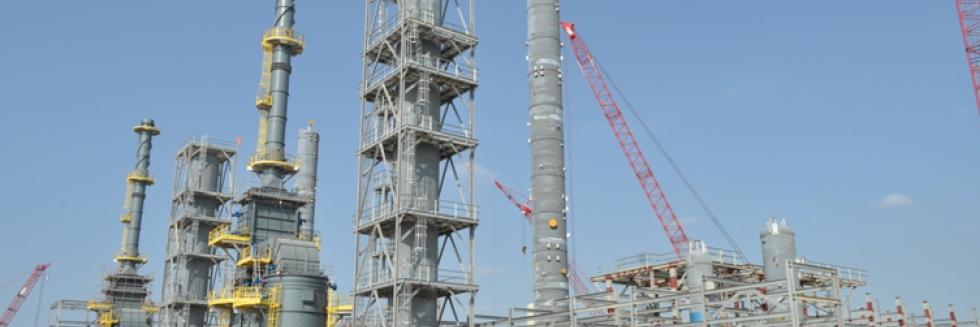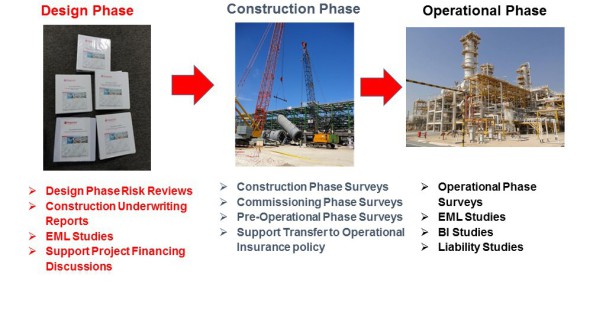
Construction Project Risk Engineering Reviews
Elantis provides insurance focused risk engineering support to its clients through the various phases of a project lifecycle; from the design phase, through the construction phases, commissioning, start-up and early operational phases.
Design Phase Risk Review (DPRR)
Elantis' engineers have completed insurance focused Design Phase Risk Reviews (DPRR) of numerous world scale onshore and offshore upstream oil and gas and midstream/downstream petrochemical, LNG and refining projects around the world for some of the major operators within the industry.
Ideally the DPRR should be completed following the completion of the FEED package for the project, and prior to the award of the EPC contract, such that any further opportunities for risk mitigations/improvements identified during the risk review can be included within the EPC phase of the project.
The DPRR is tailored to achieve the following principal objectives for our clients;
- Independently evaluate and review the standard of loss control mitigations to be implemented by the project. Where opportunities for further risk mitigation/improvement are identified, improvement recommendations are made in order to maximise the inherent design safety features of the project, minimise the potential severity and likelihood of a loss event materialising during the project life and to minimise the total cost of risk over the project’s lifecycle.
- The implementation of the proposed opportunities for further risk mitigations/improvement during the EPC phase of the project can avoid expensive retrospective modifications during the operational phase of the project.
- Provide an opinion on the quality of the risk mitigation strategies to be implemented by the project (in comparison to world best practice) in order to differentiate the project from other similar global projects.
- Evaluation and quantification of property damage (PD), machinery breakdown (MB), delay in startup (DSU) and liability exposures inherent to the project which can be used by project owners to structure the project’s insurance requirements.
- Facilitate discussions with potential project lenders regarding the insurable risk exposures inherent to the project and limits/coverage of insurance required by the project in order to fulfil any insurance obligations that the project lenders may stipulate.
- Facilitate the preparation and delivery of a market accepted technical insurance underwriting submission report to support the insurance placement requirements of the construction project.
Construction Phase Risk Review
Elantis has completed construction phase risk engineering reviews of a number of major oil/gas, petrochemical and refinery projects on behalf of project owners and insurance underwriters. The construction phase risk engineering reviews are tailored to achieve the following principal objectives;
-
Assess the risk, identify exposures and improve risk control for the mutual benefit of the Insured and Insurers. Where unmitigated risks and exposures are identified risk improvement recommendations will be proposed where appropriate. Review the loss control standard being implemented during the construction phase, including, health and safety, quality control and assurance, equipment storage and preservation
-
Review any changes to the project scope of work which could change the risk profile of the project.
-
Review any changes in the project costs and predicted revenue forecasts for the project which could alter the Property Damage (PD) and Delay In Start Up (DSU) risk exposures.
Commissioning / Pre-Operational Phase Risk Review
The objective of the commissioning/pre-operational phase risk engineering survey is to gather key insurance underwriting information to support the transfer of the project from a construction insurance policy to an operational insurance policy. The commissioning/pre-operational phase review will typically assess the following;
-
Review the standard of pre-commissioning, commissioning and Pre-Start-Up Safety Review (PSSR) activities implemented by the project.
-
Evaluation of property damage (PD), business interruption (BI) and liability exposures inherent to the project assets.
-
Evaluation the loss control standards incorporated into the design of the project asset
-
and the management systems of work that are to be implemented during the operational phase of the project.


